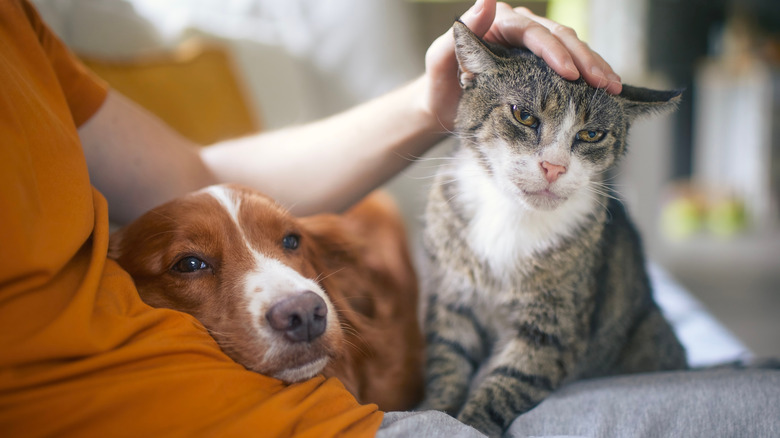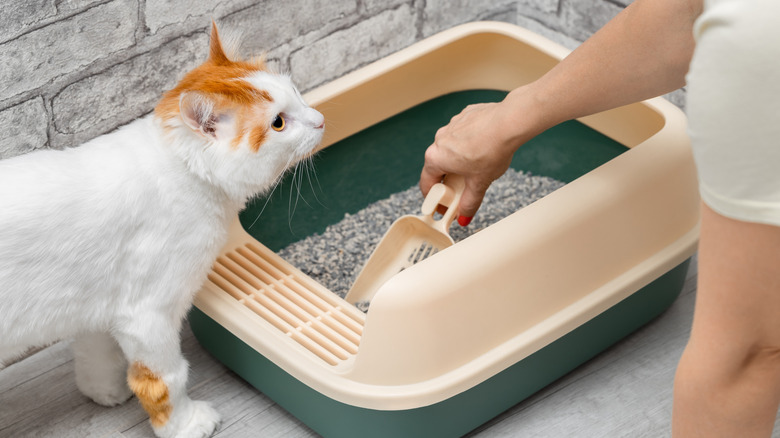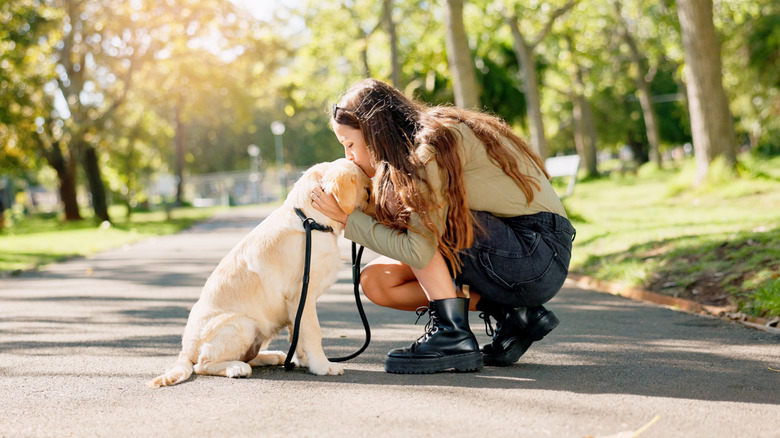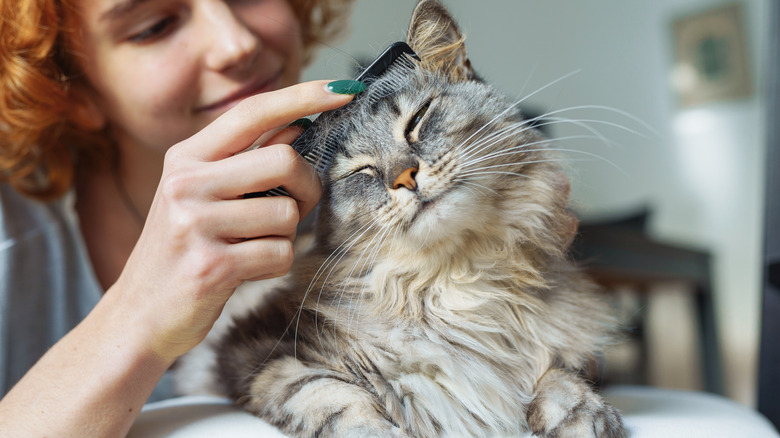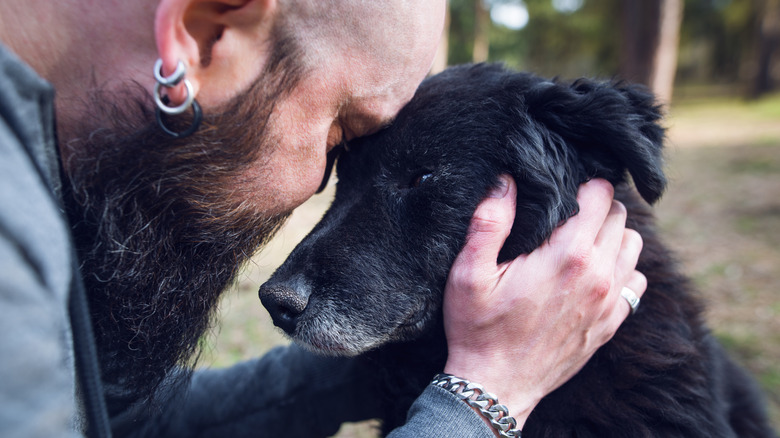Unexpected Side Effects Living With A Pet Could Have On Your Health
From a first-time caretaker to a seasoned owner, pets impact the lives of their humans in a number of ways, both positive and negative. Every fur baby comes with challenges and joys. The bond between a pet and its owner can be hard to measure until you have had one in your life, and even science has struggled to fully understand the ins and outs of human-animal relationships.
Whether you live with furry, feathered, or scaly friends, pets can substantially affect your life and often come with surprises. Notably, your little companions can have a pretty profound impact on your mental and physical health. Many of these side effects have been backed up by research that quantifies what most pet parents have experienced firsthand — even if they didn't realize it.
Cat scratch fever
While the first thing that comes to mind when you hear "cat scratch fever" may be the song from Ted Nugent, this occurrence has less to do with the singer's predilections and more to do with the condition that is (somewhat unfairly) attributed to scratches from felines. Also known as cat scratch disease or bartonellosis, this bacterial infection may develop when your skin gets pierced — like from a playful swipe from a kitty. However, rather than the feline itself, the condition comes from fleas that transfer the bacteria between cats.
Cat scratch fever can surprise pet parents because it seldom occurs; about 1 in 10,000 people experience it, per VCA Canada Animal Hospitals. Moreover, only around 2,000 people in the U.S. need hospitalization for it on a yearly basis. Symptoms of cat scratch fever include tiredness, mild fever, and chills, likely lasting less than a week. Your lymph nodes can also become inflamed for multiple weeks or months.
As a cat owner, you may have experienced the condition and not even realized it, as the symptoms are generally mild. According to the American Academy of Family Physicians, you may be able to treat cat scratch fever at home with over-the-counter painkillers and a warm compress to soothe infected areas. Don't worry too much about your kitty; they usually can work it out of their system themselves, or if the condition persists, they may need a mild antibiotic to help fight it off. To minimize infections, keep your feline on flea and tick prevention medication and trim your cat's nails regularly.
Allergies
Allergies can undoubtedly surprise some owners, as the cute little kitty or puppy that stole your heart at the animal shelter may be less friendly to your sinuses once you have them in your home. Despite what many people believe, animal allergies don't stem from their hair, but rather the protein in their' dander, saliva, or urine. Pet hair can collect the dander, but it is not the source.
Pet allergies are common, affecting 10 to 20% of the people in the world, according to Asthma and Allergy Foundation of America. However, the chances of developing such allergies may decline when people are introduced to cats and dogs at a young age. A 2018 study published in PLOS ONE concluded that "allergic disease in children aged 7–9 years is reduced in a dose-dependent fashion with the number of household pets living with the child during their first year of life."
A person will likely start to notice an adverse reaction to their furry companion following prolonged exposure to pet dander, with symptoms including runny nose, itchy eyes, and other discomforts, per Mayo Clinic. Some individuals experience skin irritation, and the severity differs from case to case. Complications can happen with asthma and sinus infections, but generally, you can treat pet allergies at home with antihistamines and decongestants. Hypoallergenic felines and canines are a myth, as all pets carry a degree of dander, but some cat and dog breeds are less likely to trigger allergic reactions.
Toxoplasmosis
Toxoplasmosis in cats has long been one of the more talked-about health side effects that at one point contributed to the notion of the "crazy cat parent." In the past, researchers believed that having a kitty increased the chance of psychosis due to a protozoan that lives in the stool of some cats, scientifically known as Toxoplasma gondii. Research completed in 2017 by Cambridge University found that the issue may be more complex and require further study. There is not enough research showing a relation between toxoplasmosis and mental health, with the exception of side effects in pregnant women and children.
Myths surrounding toxoplasmosis include that pregnant women must avoid litter at all costs and, in some cases, give up their cat. The truth is that the chances of getting toxoplasmosis are very low, with the CDC (via the FDA) reporting, "it's estimated that toxoplasmosis infects between 300 and 4,000 fetuses in the U.S. each year." However, toxins are still a concern for pet parents, so it is always recommended to safely dispose of litter by sealing it in a separate bag and not leaving it loose in a garbage can; you can also use gloves to protect your hands.
Illness is uncommon, but babies born with toxoplasmosis can experience developmental problems. It can also have adverse physical effects on adults, like fever, headaches, joint pain, and general feelings of illness. Yet, the CDC also states that about 50% of infections come from food (via the FDA). In addition, indoor cats that don't eat raw meat are unlikely to contract Toxoplasma gondii.
Your pets may impact your sleep quality
Many pet parents weigh the pros and cons of letting their furry friends join them in bed. Yet, denying a little (or big) furnace that wants to cuddle up with you at night is hard. Once you let a cat or dog sleep with you overnight, they may start to believe they are entitled to doing so. If you do not train your canine to sleep in its own bed, your nighttime routine may change.
Studies on how pets impact sleep are still limited and offer conflicting information. Past research has shown that dogs may help improve their owner's sleep by relieving stress through bonding and creating better nocturnal patterns due to the exercise and schedule requirements of caring for them. Other studies concluded that cats may affect their owners' nighttimes negatively, as felines are often on different timetables than their caretakers and awake during dusk and dawn.
Research conducted in 2023 sheds additional light on this subject. Results taken from a sample size of 5,499 showed some negative results, concluding that "having a dog was associated with greater odds of having a sleep disorder and having trouble sleeping" and "having a cat was associated with greater odds of having leg jerks." However, the study acknowledged outliers and the need to continue researching the potential mental health benefits of owning a pet that might improve sleep.
Pets may help alleviate stress and anxiety and improve your mood
The science behind how pets can improve their owners' lives is ever-growing and offers some impressive observations. Interacting with animals has been shown to decrease levels of the stress-related hormone cortisol. At the same time, interacting with your furry friend can increase levels of oxytocin, serotonin, dopamine, and endorphins, positively affecting your mood and aiding in alleviating stress, anxiety, and pain.
The impact of pets on mood has potential applications in multiple scenarios. "There's not one answer about how a pet can help somebody with a specific condition," explains Dr. Layla Esposito, who oversees NIH's Human-Animal Interaction Research Program. "If your goal is reducing stress, sometimes watching fish swim can result in a feeling of calmness. So there's no one type fits all."
2020 research published in Clinical Gerontologist showed that a pet companion "effectively attenuated symptoms of depression, anxiety, cognitive impairment, and the behavioral and psychiatric symptoms of dementia (BPSD)" for older people. Additionally, APSARD reported in 2013 that pets could help children with ADHD build stronger social bonds; a 2015 article published in Developmental Psychobiology also found similar benefits in children with autism.
Having a pet is good for your heart
Heart health benefits primarily come from adopting a dog (though other pets can still contribute). This perk may manifest somewhat naturally when you introduce a new pup into your life, given their ongoing need for walks, playtime, and potty breaks. If you are naturally active, many joys come with having a pup as a running partner; think of them as your cheerleader for a healthier life.
Aerobic exercise, such as brisk walking or running, naturally improves circulation, which helps lower blood pressure and heart rate. It also allows the heart to handle the stress of exercise. A 2008 study addressed how much more activity dog owners see, finding, "The odds of achieving 'sufficient physical activity,' 'sufficient walking,' and 'sufficient walking for recreation in the neighborhood' remained 57% to 77% higher among dog owners compared with nonowners." Generally speaking, the more activity, the healthier the heart, among other health benefits.
Thankfully, those restricted from living an active lifestyle can still enjoy heart health benefits from animal companionship. An article in Harvard Health Publishing reported that several studies showed that owners can experience lower blood pressure because of their animal companion's calming effects. There may also be some correlation with lower cholesterol and triglyceride levels in pet parents.
Pets can help with therapy
Owning a pet of any kind may help those living with specific mental health challenges. Treating borderline personality disorder can look different for many people, but dialectical behavior therapy (DBT) is may offer some solace. Part of this approaches includes grounding oneself in the moment, and pets have become a great way to practice mindfulness.
Emotional support animals practicing DBT have shown participants more likely to express empathy and patience and an openness to discussion. Moreover, they help bring skills learned in therapy into everyday use, including practicing mindfulness, accessing their 'wise mind' (finding that ideal balance between emotional and rational thinking to approach challenges with clarity),' and utilizing self-soothing techniques. Concentrating on your companion's actions, the feel of their fur, and their profound love for you are all elements that can help with therapy and self-care.
Therapy dogs have also made their way to classrooms, where they help improve student engagement and release stress. According to Psychology Today, dogs in classrooms have even helped improve children's reading proficiency. A 2023 study published in Frontiers of Psychology highlighted that prisoners going through pet therapy programs were more likely to open up and show compassion, leading to more open communication and an improved relationship between the staff, resulting in harm reduction while in the system.
Pets can change your perception of others
When you become a pet parent, you may notice your perception of the world shift. These changes can be as simple as finding enjoyment in the smiles of others as you walk your proud pup down the street, having conversations with people you would not have before, or bonding over stories about your adorable companions. There is an undeniable social element to having that furry friend in your life that can catch first-time owners off guard.
According to 2015 research from PLOS ONE, "companion animals can be a catalyst for several dimensions of human social relationships in neighborhood settings, ranging from incidental social interaction and getting to know people, through to formation of new friendships." The methodology for the study involved speaking with over 500 people in three major cities and comparing the neighborhood interactions of non-pet owners with those who had a furry friend in tow. The research also summarized that pets could go a long way in helping build positive communities.
The reverse, though, can also be true. A doggo or kitty's caretaker may distrust those who don't like animals (or those who their pets don't warm up to). While there has not been comprehensive research that shows how pet owners perceive people who dislike their companions (or vice versa), anecdotally, you can find many cases of people expressing their distrust. In an article on Medium, cat owner Nancy Parish related this sentiment: "I think animals know who the bad people are. If your dog or cat doesn't seem to like the person you're dating. That could be a sign."
Pets can give you a sense of purpose
Pets can positively affect mental health, but this connection can go into more profound perceptions of life. Many parents say that their kids have become their reason for living, working hard, and trying to improve the world. Children are not an option for everyone, whether by preference or circumstance, but that does not mean that people can't find that same sense of purpose through a canine, feline, reptile, bird, or rodent.
A 2021 study from Human-Animal Interaction Bulletin examined how "hedonic or eudaimonic well-being or life satisfaction" was affected by having a cuddly kitty companion and how providing for them "increased feelings of enjoyment and enhanced owner's reported purpose in life." The research showed that the pet parents' pleasure or happiness was increased by purchasing items for play or comfort, participating in feeding or grooming, or talking to their cats.
Having someone rely on you is a comforting feeling that comes with a sense of pride when you can meet their needs. Many accept this regarding family and friends, but the same sentiment is not always extended to pets from those who haven't experienced those bonds. Anyone who has lived with one or many pets can tell you how powerful a motivator your little friend's reliance on you can be.
Being a caregiver can cause its own stresses
Furry companions can give you a deeper purpose in life, but pet ownership also presents a host of challenges. Cats and dogs come with plenty of potentially serious health issues. Carrying the emotional and financial burden of seeing a pet unwell can upend your life and have quite an impact. Those who deal with long-term care of a person can experience what is known as caregiver burden, a condition defined by emotional and mental exhaustion that can lead to fatigue, anxiety, and depression, among other symptoms, according to a paper shared in the International Journal of Nursing Sciences.
While most research on caregiver burden has been done between humans, Mary Beth Spitznagel, Ph.D. of Kent State, has spoken out about how this condition can affect people-pet relationships. She decided to study the condition more after she struggled with her dog, Allo, facing Cushing's disease and transitional cell carcinoma in the bladder over a year before their death. This experience led her to start the site Pet Care Burden to help people understand the condition and share additional studies in the field.
While this condition remains largely underexplored regarding pets, the emotional weight of having an ill animal is a sentiment that any caretaker can attest to. "Since our pets have become family, the hypothesis is that those same struggles plague pet owners also," shared Spitznagel. "Compounding this is the fact our pets can't tell us what's wrong, which adds to the stress. The more difficulty the owner experiences, the harder it becomes to care for the pet and a vicious cycle ensues." The process will look different for every pet owner and needs its own considerations. Yet, being aware of future challenges will help you prepare for the unexpected emotional toll of a sick furry friend.
Saying goodbye to a pet takes its emotional toll
When welcoming pets into your home, having to bid them goodbye one day is inevitable. People who have had multiple animal companions may tell you that the process never gets easier and that each death brings a unique grieving process. Writing for Psychology Today, clinical psychologist Liz White shared, "Grieving is messy. It involves so many different emotions that can feel intensely overwhelming, especially in the first few days and weeks after the loss."
Regarding how loss can extend to our pets, neuroscientist Dean Burnett stated in an article for BBC Science Focus, "Human brains are very capable of forming strong emotional connections. Even with individuals we've never met, or those that do not, or cannot, exist." He continued , "Why would pets be any different? ... And if we can form equally potent emotional bonds with beloved pets as we do with humans, it logically follows that we experience similar grief when they die, as studies have revealed. This suggests that the grief following the loss of a pet should be treated just as seriously as that following the loss of a family member or loved one."
The grieving process certainly takes time, and an owner may feel those pangs of loss even years after their furry companion has died. If you need to bury your pet at home to feel comfort, don't feel awkward if people don't understand your wishes. If it becomes difficult, there are plenty of resources you can reach out to, like The Association for Pet Loss and Bereavement or Lap of Love.
